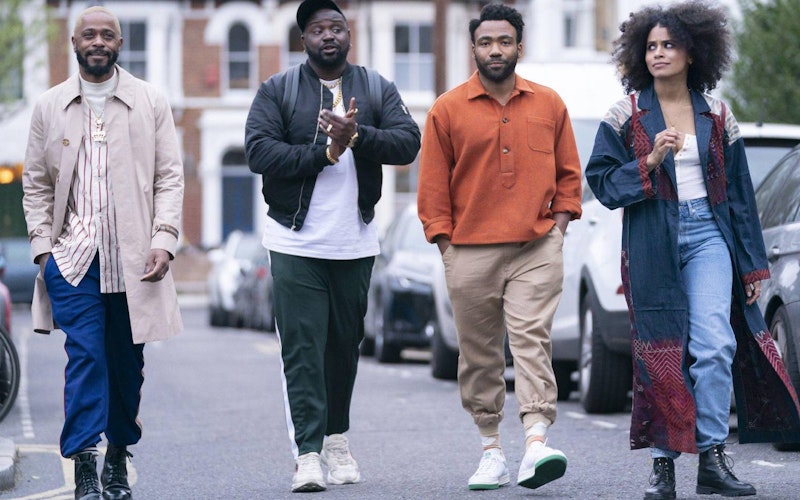
TV
Atlanta and Making Disciples of All Nations
Atlanta has tracked the pulse of the culture since it debuted in 2016, bringing a rich African-American perspective to issues of humanity, history, and politics. Now that the FX series has concluded after four seasons, we can also see how it reminds Christians that the gospel of Jesus is a gospel for all people across all cultures.
The way of Jesus is never limited to one particular cultural context. When we fail to understand cultures different from our own, we cannot fully appreciate the nuances of God's saving redemption for people of all nations. God uses what may seem weird or offensive to westernized, Euro-centric (read: white), culturally Christian sensibilities to redeem humanity.
Atlanta offers Christians an opportunity to delve into a culturally dense African-American experience and see how God loves broken people. After watching all four seasons, you may walk away with a better understanding and appreciation for a domain that at first seemed otherworldly and extraordinary.
The first season of Atlanta introduces us to the primary characters: Earnest, or Earn (Donald Glover, who also created the series); Alfred Miles, aka Paper Boi (Brian Tyree Henry); Darius (LaKeith Stanfield); and Vanessa (Zazie Beetz). Though the show primarily centers on Earn, its episodes focus on each of the main characters throughout each season, allowing viewers to learn about each individual in intimate ways.
Earn is an intelligent Princeton University dropout who struggles to maintain a stable job, is in a complicated relationship with Vanessa, his baby momma, and is cousins with Alfred/Paper Boi. Alfred has creative talent as a hip-hop artist, but holds back from giving his best effort for fear of failure. Each season reveals that Alfried is a complex individual who is self-aware of his weaknesses.
Alfred’s friend Darius is also complicated, but certainly self-"unaware." Darius sees the intricacies of the world and appreciates the nuances and beauties of each predicament he finds himself in, but he lacks the self-awareness to avoid the potential danger that seemingly awaits him at every opportunity. In this way, he acts as the show's conscience, revealing what's obvious when we, the viewers, may not recognize what's awkwardly in front of us. Vanessa, or “Van,” is very blunt and has an upfront personality. Though she is confident, she struggles with identifying her value early in the series and finds herself in unfortunate predicaments, due to some of the people she associates with.
The way of Jesus is never limited to one particular cultural context.
Using an explicitly Black lens, each season contains distinct thematic adventures that cover a winding journey of pop-culture scenarios, as well as psychological and sociological behaviors. Atlanta covers poverty, police brutality, and the white savior complex, as well as inner-city politics, daddy issues, and mental health. To fully appreciate what Atlanta accomplishes, you must learn, experience, and/or absorb African-American culture. Though there are many classic episodes, there is one that can bridge the gap for Christians seeking to diversify their churches and communities.
In the “Trini 2 De Bone,” from Season 3, an affluent white New York family grapples with the passing of Sylvia—their Trinidadian nanny. While it's clear that parents Miles (Justin Hagan) and Bronwyn (Christina Bennett Lind) had limited, transactional interactions with Sylvia, their son Sebastian (Indy Sullivan Groudis) had a transformational relationship with her. At Sylvia’s funeral, Sebastian comfortably participates in the hymns, the call and response from the pastor, and the Trinidadian sayings. Miles and Brownyn, however, look awkward and uncomfortable. When a fight breaks out among Sylvia's family members during the funeral, Sebastian’s parents decide to leave. But before they can, one of Sylvia's family members gets on the microphone and yells, “Stop, you're scaring the white people away!” He prompts Sebastian and his family to not be afraid, telling them that this altercation is one of the ways they express their grief.
This is one of many catalyst moments in Atlanta. It projects our stark cultral differences. It's also a reminder that proximity does not necessarily produce relationship. Relationships take investment and a loosening grip on what we deem normal. And this is what makes Atlanta an exceptional show. Atlanta challenges everyone to examine our internal prejudices and stereotypes, while spotlighting the hypocrisy embedded across many cultures. Different doesn’t always mean bad. So like Sebastian, Christians ought to take the childlike approach and appreciate cultures that are different from our own, rather than simply critiquing or running away from the discomfort.
Jesus commanded his followers to make disciples of all nations. In Vince Bantu's A Multitude of All Peoples: Engaging Ancient Christianity's Global Identity, Bantu reveals that the church has been doing just that for thousands of years—not by siege or by changing cultures, but by respecting cultures and introducing the gospel by way of intercultural communication. Bantu concludes that "God has been at work among every nation since the beginning. From the moment God called Abram to the progenitor of God's chosen people, the vision for this plan was intrinsically global."
For Christians to continue to be effective partners in God's global plan of salvation, it's wise to view shows like Atlanta as a way to see God's redeeming work through various cultures. For instance, if we want to better understand Jesus' parables, it's important we understand them from a first-century, Middle Eastern Jewish perspective, rather than projecting our 21st-century culture on his words. The same is true if we want to understand Atlanta and use it as a bridge to help us build communities. You have to understand blackness to appreciate Atlanta.
Topics: TV